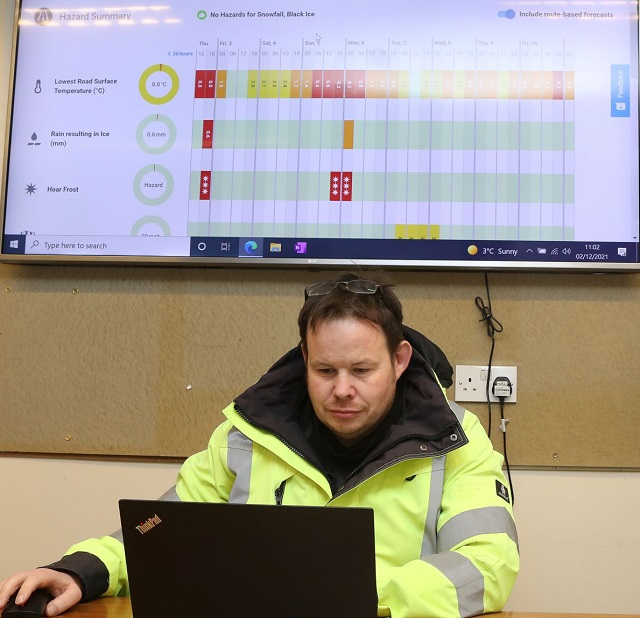Getting to the nitty gritty of keeping our roads safe
Date: 6 December 2021

Tucked away in a fairly snug but warm office at the Council’s winter maintenance headquarters at Hatston, you will find a small team who are in charge of getting the gritter drivers to where they need to be.
Alongside the drivers, the duty officers have a vital role to play in ensuring the county’s roads are as safe as they can be during the winter months when the temperature dips, but also for maintaining them all year round.
The office-based team rely on forecasts coming through and analysing what will be needed where – but, importantly, they are also assisted by the local knowledge and experience that comes from the crews on the ground.
They feed information back and forth to one another -and treatments may vary as a result.
Clive Munro has worked for the council for ten years and has been in his current role as a Roads and Environmental Services Technician since 2017.
It’s a hive of activity within the Hatston depot – from the drivers to the storemen, garage mechanics to the footpath crews, the managers to admin– everyone has a role to play.
This winter for the first time they are trialing a new system which allows the treatment – rock salt - to be targeted where it’s needed.
The technology provides updates on road surface temperatures for the road network across Orkney – enabling the team to identify specific parts that require treatment, rather than large geographic areas.
There are 370km of priority one roads in Orkney, 410km of priority two routes and 206km of priority three roads.
Clive recalls last Christmas which turned into a marathon effort for the crews.
“It was morning and night every day from Boxing Day until mid-February culminating in the significant snow fall during Valentine’s weekend. Although it was draining, there’s also a buzz about the place when there’s plenty happening.”
As you would expect a decision has to be made the day before based on the forecasting as to what will be required early the next morning.
“The severity of the conditions dictates what treatment will be done. For example, last Thursday when the road surface temperatures dipped pretty much across the county, it meant salting across the board. We had 19 drivers out, six people on footpaths and several more at the quarry sorting the salt supply.
“There’s three of us in the office – a duty technician, duty officer and duty supervisor. We monitor the conditions, make the decisions on the treatments to be done where and task the crews on how much salt to put down.
“We have different levels of salt treatments which we use depending on the severity of the conditions – it’s either 10g per square metre, 20g or 40g for the most severe. The Gritters are routinely calibirated to ensure we are applying the required material spread rate to the carriageway surface.”
The salt isn’t gold dust – and needs time and traffic to start working its magic.
The routes are broken down into sections – for example, one driver will be tasked to go from Kirkwall to No 1 Churchill Barrier and will be asked on the conditions en route. Based on this, treatments can be adjusted. So, it’s a mixture of tech and driver experience.
The duty team also work closely with Police Scotland when it comes to any road closures that may be required, particularly at the Barriers. Ultimately, it’s a police decision to make that call.
“Again, it’s a case of reviewing the forecast, reviewing the tide levels and wind direction. If concerned we get in touch with the police and arrange to review the barriers about three hours before high tide. We provide updates on Twitter and folk are good at keeping an eye on that. We keep continual reviews in place and if the police want a barrier closure, we call out our team to close at the one end and the police arrange with the coastguard at the other.”
You can keep an eye on the Road team 24/7 twitter feed where updates are posted when conditions become tricky https://twitter.com/OIC_Roads
Clive continued: “We all have a vested interest in the maintenance and safety of the county’s roads as we all use them. Everybody just wants to do a good job and it’s really morale-boosting when we get the messages of thanks from the public. We don’t do it to get praise, but it’s very welcome when it comes in and we find that 99 per cent of folk do appreciate what we do.”
If you want to know more the Council’s Winter Service Plan is available here.
-
Category:





